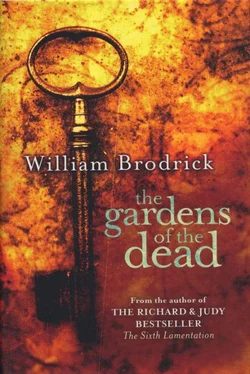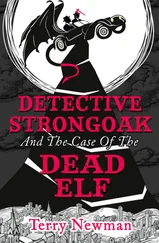William Brodrick - The Gardens of the Dead
Здесь есть возможность читать онлайн «William Brodrick - The Gardens of the Dead» весь текст электронной книги совершенно бесплатно (целиком полную версию без сокращений). В некоторых случаях можно слушать аудио, скачать через торрент в формате fb2 и присутствует краткое содержание. Жанр: Триллер, на английском языке. Описание произведения, (предисловие) а так же отзывы посетителей доступны на портале библиотеки ЛибКат.
- Название:The Gardens of the Dead
- Автор:
- Жанр:
- Год:неизвестен
- ISBN:нет данных
- Рейтинг книги:4 / 5. Голосов: 1
-
Избранное:Добавить в избранное
- Отзывы:
-
Ваша оценка:
- 80
- 1
- 2
- 3
- 4
- 5
The Gardens of the Dead: краткое содержание, описание и аннотация
Предлагаем к чтению аннотацию, описание, краткое содержание или предисловие (зависит от того, что написал сам автор книги «The Gardens of the Dead»). Если вы не нашли необходимую информацию о книге — напишите в комментариях, мы постараемся отыскать её.
The Gardens of the Dead — читать онлайн бесплатно полную книгу (весь текст) целиком
Ниже представлен текст книги, разбитый по страницам. Система сохранения места последней прочитанной страницы, позволяет с удобством читать онлайн бесплатно книгу «The Gardens of the Dead», без необходимости каждый раз заново искать на чём Вы остановились. Поставьте закладку, и сможете в любой момент перейти на страницу, на которой закончили чтение.
Интервал:
Закладка:
George sat up, rubbing his eyes. ‘Do I have to, I mean -’
‘Yes.’ Her voice was raised. She lost control, ever so slightly; just enough to send him back to Bow ‘You’re not walking away this time, David George Bradshaw’
5
Pale morning light described Roderick Kemble QC behind his desk, a revolver in one hand and a document in the other. With savage concentration, he examined the rotation of the chamber while he slowly depressed the trigger. ‘Take a seat,’ he said after the click. As if there’d been no interval between now and the night before, he added, ‘Riley said Bradshaw stood behind the allegations laid against him?’
‘Yes.’
‘How did you propose to undermine Mr Bradshaw?’
‘Frank Wyecliffe’s only thought was that it was odd to use your second name when the first one was ordinary. At the time I thought he’d lost his marbles – so did Elizabeth.’
Anselm’s mind tracked back to the rest of that conversation with her. They were in the common room. She said, ‘Do you think Riley is innocent?’
‘No.’
She took the last Jaffa cake and ate it with small bites. ‘Would you cross-examine Bradshaw?’
‘Of course.’ Ordinarily the QC handles the main witness, not an underling. At the time Anselm had attached no importance to the request.
A gentle cough brought him back into Roddy’s presence. Anselm spoke softly searching for the meaning of words spoken long ago, ‘Elizabeth said, “This is your chance to do something significant.”’
Anselm’s problem was that he would have to call Bradshaw a liar – in however polite a fashion – without any justification. There was no evidence whatsoever that he had conspired with the girls to frame Riley When Anselm rose to his feet, all he had was an intuitive awareness that Wyecliffe had been right: the use of one’s middle name was unusual.
Roddy once joked that decisive cross-examinations fell into one of three categories. First, where counsel prevails in a clean argument over facts that will bear more than one interpretation. Second, where counsel is armed with devastating information, which need only be revealed at the right moment to clinch the day But there was a third: where counsel doesn’t know what he is talking about. Anselm put his encounter with Mr Bradshaw into this last category. Elizabeth might have thought the change of name worthless, but Anselm was the one at the wheel. He moved forward tentatively, following the implications of each answer. Most of Bradshaw’s replies had been ‘Yes.’ It had been an entirely civilised exchange.
‘You call yourself George, is that right?’
‘Yes.’
‘But your first name is David?’
‘Yes.’
‘How did you come to call yourself by your second name?’
‘I didn’t like the first one.’
Most barristers develop a keen sense of intuition – because they have failed to see the obvious time and again. It’s a kind of hunting instinct, a sniffing for a scent. And the dislike of an ordinary first name struck Anselm as unconvincing. Without instructions or vindicating facts, Anselm decided to follow his nose.
‘People change their names for all sorts of reasons?’
‘Yes.’
‘More often than not it is to turn over a new leaf.’
‘Yes.’
‘One life ends, so to speak, and another begins?’
‘Yes.’
‘Is that what you did?’
‘Yes.’
Anselm paused, letting his imagination loose.
‘It meant, I suppose, David slipped quietly away?’
‘Yes.’
‘And George stepped forward?’
‘Yes.’
Anselm didn’t make the mistake of asking ‘Why?’ Instead he shifted ground completely, still feeling his way.
‘You are the manager of the Bridges night shelter?’
‘Yes.’
‘Where you have worked for twenty-three years.’
‘Yes.’
‘You are there to serve the needs of a highly vulnerable client group, are you not?’
‘Yes.’
‘Indeed, as I understand it, you’ve had people in your care as young as nine?’
‘Yes.’
‘I expect an employee in your position must be of the very highest character?’
‘Yes.’
Anselm paused, watching every inflection on the face of the witness.
‘Tell me, Mr Bradshaw, whom did the night shelter employ:
David or George?’
‘I don’t understand.’
‘What name did you give on the application form?’
‘George.’
The next amateur question would have been another ‘Why?’ Anselm avoided that temptation: the important point to appreciate at this stage was that everything Bradshaw had said might go in one of two directions: innocent or compromising. Roddy often said that with an honest witness, the wider the question the better, because they are disposed to impose relevance upon it -their consciences take them to the crucial, unknown detail. Anselm needed to find out if there was a link between Bradshaw’s dropping his first name and his taking employment under the second.
‘Mr Bradshaw, have you ever done anything that came to the attention of the police?’
‘Yes.’
‘Now, would that have been as David or George?’
‘David.’
Now Anselm had to make his final move. There was no other territory to explore. Bradshaw was either going to exonerate himself completely by revealing an unpaid parking fine, or he just might divulge something that could be used against his integrity. He said: ‘What did David do that George wanted to forget?’
The courtroom makes everyone a voyeur. The witness is often stripped bare, way beyond what clothing can conceal. It is darkly fascinating and can leave the viewer stained with pleasure. These things Anselm had learned long ago. But as he spoke to Roddy the electricity of this particular spectacle surged through him as if this were the first, forbidden time. Bradshaw stared across the well of the court, his face pale. The jury watched him – as did the lawyers, the ushers, the reporters and the bystanders. Looking down on this exhibition, a judge held his pen above a page. Not a shred of detail would be lost to the official record. Then, as if someone had called his name, David George Bradshaw stepped out of the witness box and walked out of the court. Half an hour later Riley went through the same door, a free man.
Roddy kept his papers and court dress in a tartan suitcase on wheels. It bounced and ratted after him as he pulled it through chambers and onto the stairs that led to Gray’s Inn Square. Anselm followed, convinced that Roddy’s close examination of the revolver – an exhibit taken out of court with permission -had served some useful purpose, but that the true reason was the commotion that would shortly erupt when he tried to take it back in. Anselm, though, had other concerns. ‘Something shot over my head in that trial.’
‘Isn’t it always thus?’ He waddled along the pavement as if he were on the way to Corfu.
‘This time it was different. I’ve been wondering why Elizabeth kept the brief in the first place.’
Roddy bounced his valise over a kerb. ‘Sorry, old son. The question never entered my head.’ He became studious. ‘Forgive me, I must now dwell upon triggers and safety catches. Do you know, in certain circumstances, it’s rather difficult to press one without putting pressure on the other? That ought to kick up some doubt.’
They parted and Anselm watched Roddy nod greetings to left and right as he trundled down Holborn towards the Bailey The rogue never asked the question, thought Anselm, because he’d always known the answer.
6
The memory of Mr Wyecliffe ruined Nick’s cornflakes. It was like sour milk. He had never quite appreciated the twilight world of compromise that his mother had inhabited. Nick had woken troubled by three questions. He would deal with two of them over breakfast. His father sat opposite him, examining a boiled egg.
Читать дальшеИнтервал:
Закладка:
Похожие книги на «The Gardens of the Dead»
Представляем Вашему вниманию похожие книги на «The Gardens of the Dead» списком для выбора. Мы отобрали схожую по названию и смыслу литературу в надежде предоставить читателям больше вариантов отыскать новые, интересные, ещё непрочитанные произведения.
Обсуждение, отзывы о книге «The Gardens of the Dead» и просто собственные мнения читателей. Оставьте ваши комментарии, напишите, что Вы думаете о произведении, его смысле или главных героях. Укажите что конкретно понравилось, а что нет, и почему Вы так считаете.












